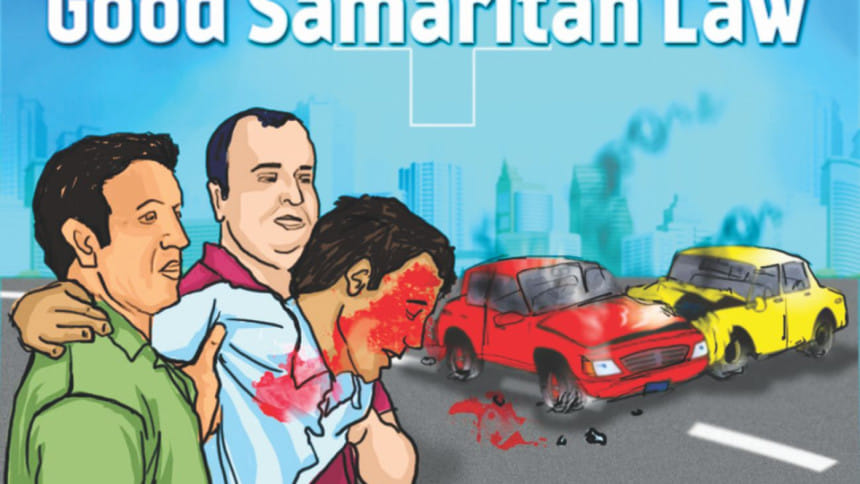Good samaritan law, or the lack thereof

ACCORDING to a study conducted by Bangladesh Jatri Kalyan Samity, it has been found that, in 2014 approximately 8,589 people died in road accidents. This roughly calculates up to at least one death per hour. As the numbers cannot be verified by an official databank, realistically it is probable that the death toll is much higher than what may have been reported throughout the country.
Such a high toll of death can also be attributed by poor law enforcement policies and a sheer lack of emergency medical care. According to experts, where a victim of fatal road accident receives medical assistance within an hour of the incident, their chance of surviving can be increased by up to 50%. The one hour period after the accident, is deemed as the golden hour, and it is likely that catastrophes may be averted if the victim is admitted in a hospital within that time. Sadly, the common scenario in Bangladesh revolves around - the victim abandoned on the side of the road in a serious condition with fatal bodily injuries. The general public are awry of volunteering to save lives of those who are in dire need, simply because of the bitter experiences of being harassed in the hospital, by the police and the risk of being sued with a civil or criminal charge.
Even though the Penal Code, 1860 of Bangladesh includes a provision which provides that an act will not be constituted as an offence when it is done without consent but in good faith for the benefit of an individual, it is not widespread knowledge. The general public barely has access, or awareness of this single legal provision embedded within the laws of Bangladesh, and therefore it has not been successfully interpreted into our lives. The common belief is rooted in fear of persecution for being benevolent through this cause.
In North America and most European countries, a specific legal framework, called the Good Samaritan law exists. Good Samaritan laws offer legal protection to people who give reasonable assistance to those who are injured, ill, in peril, or otherwise incapacitated. It seeks to provide legal protection and thereby reduce hesitation of bystanders for helping the ill or injured. Through the law, the benevolent bystanders are not held liable for any unintentional injury or wrongful death that occurs through such assistance.
However, it is a novel concept in south-east Asia. This year as a significant move on their part, the Supreme Court of India initiated a draft legal framework for Good Samaritan law. The panel published recommendations, which mainly indicates that the law would: (i) protect good Samaritans from procedural harassment and legal liabilities; (ii) allow good Samaritans to assist without disclosing their identity; (iii) allow witness to make official statements through affidavits; (iv) witness statements be recorded in a single hearing; (v) make first-aid training compulsory insecondary board curriculum; (vi) launch first aid-centres and ambulances within every 30 km on a national highway; (vii) introduce disciplinary action fordoctorswho refuse to treat road accident victims; (viii)issue obligatory regulations for hospitals on admitting accident victims, specifying that those accompanying them should not be detained or asked to pay fees;and (ix) inflict strict penalties on hospitals, in case of non-compliance. According to Save LIFE Foundation, India - such an initiative could save up to 70,000 lives a year.
As a country which is experiencing development at an incredible accelerating pace, it is likely that adoption of a similar framework will safeguard our interests further and probably save thousands of lives. Advocacy for such laws by civil societies would also create awareness among the mass and the Government, and educate them on taking the right step towards preventing untimely deaths. Furthermore while we wait for a specific law, we should not hesitate in saving lives where possible - as a single provision does exist to offer somewhat protection, until the specific statutory regulations arrive.
The writer is a Barrister, Lincoln's Inn, UK.

 For all latest news, follow The Daily Star's Google News channel.
For all latest news, follow The Daily Star's Google News channel. 



Comments